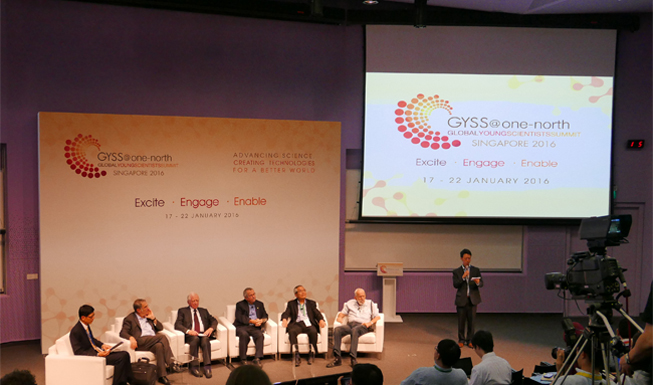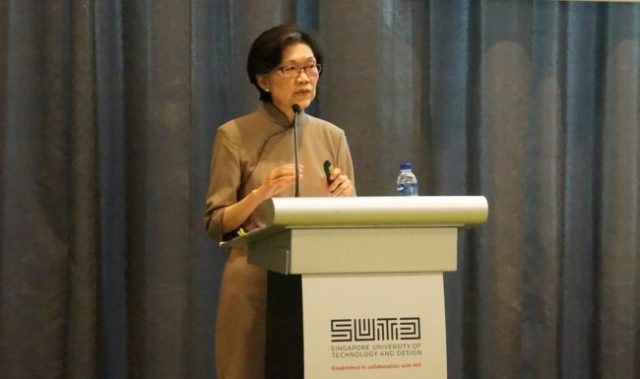
AsianScientist (Jan. 27, 2017) – We are in the midst of a revolution that most people don’t even realise is happening, said Dr Jürgen Kluge, Chairman of the Lindau Foundation Board and Council Member for the Lindau Nobel Laureate Meetings.
Speaking at the closing ceremony of the Global Young Scientists Summit 2017 (GYSS 2017), Dr Kluge noted that the world’s transition from analogue to digital technologies, which began in the mid-20th century, continues even today.
This digital revolution brings with it unimaginable possibilities and young scientists would do well to set high targets for themselves, he said.
The power of exponential growth
The first revolution in the realm of communication was the invention of speech, said Dr Kluge. Next, the advent of writing allowed people to communicate with those who lived after them.
“The next revolution was the printing press with movable letters, which made it cheap to communicate. The follow up to that was the Reformation, the splitting of the Catholic Church, the Thirty Years War and the French Revolution,” he explained.
“While the first revolution took ten thousand years, writing a thousand years and the printing press a hundred years, we are now in a fourth revolution—the digital revolution—which took just ten years.”
People might not realise that we are currently living in revolutionary times because we are at the cusp of the exponential phase of growth, Dr Kluge said.
To illustrate the sometimes unexpected power of exponential growth, Dr Kluge told the story of how the inventor of chess asked the Shah of Persia to reward him with one grain of rice on the first square of the chessboard, two grains on the second, four on the third and so on.
“The Shah said, ‘That’s easy, I’ll do it.’ But what he didn’t realise was that if each grain of rice weighs approximately 30 milligrammes, by the 64th square of the chessboard, the rice would amount to 276 trillion tonnes. That’s enough to cover the entire country of India 30 centimetres deep!” he said.
Similarly, the exponential growth of computing power means that laptops will catch up to the human brain in just 15 years, Dr Kluge said. In fact, by his estimate, a single laptop would have the same processing speed of all the brains in the world combined by the year 2045.
“Should that scare us? I don’t think so. As always, technology is an amplifier for things that are good or bad. I think it’s a huge opportunity, especially for young scientists,” he said.
Values matter
Drawing from his experience in the corporate world, Dr Kluge said that the best way for young scientists to negotiate these revolutionary times is to have a strong set of values to guide their decisions.
During his time as a consultant, he once asked one of his researchers to study why companies fail. Going through a few hundred cases worldwide, the researcher found that only 15 per cent of failures were attributable to bad operations or high costs. Another 15 per cent were due to wrong strategy or poor investments.
“But the main reason was moral failure of one guy, or a very small group of people. Look at the scandal of diesel emissions cheating at Volkswagen, for example. All it takes is for one person to behave in a morally unacceptable way for whole companies or even whole nations to get into really big trouble.”
“So it’s people and values that count. You can’t make compromises,” he argued.
In particular, scientists should not compromise among the three goals of quality, cost and speed, Dr Kluge added.
“Don’t trust people who tell you something will be better quality but will cost more. Don’t trust people who tell you it will be done faster but you have to invest a little bit more. No, the trick is to come up with ideas that will simultaneously optimise all three dimensions,” he said.
This philosophy has led him to pursue corporate strategies that focus on people, planet and profit. Plans are rejected if they increase profits but treat people unfairly or pollute the environment.
“The driver for this strategy is your internal value system; if that is spoilt you might go for compromises. It’s a tall order, but you have to set your sights on the tough ideas that help you reach this goal,” he said.
A chance to shape the world
Quoting Mark Twain, who said that history does not repeat itself but that it does rhyme, Dr Kluge urged the audience members to take their place in history seriously.
“It’s up to your generation to decide. Either it’s a steep uphill climb or a well-paved downward highway to hell. Our world is at a crossroads at the moment, one sign points in the direction of a rational, liberal, inclusive and open world; ultimately, peace. If you invert that to the negative—a post-truth, authoritarian and closed world—it always ends up in military conflict and war,” he said.
“All of you are very important; so don’t let the world be shaped around you, shape it yourself.”
Asian Scientist Magazine is a media partner of the Global Young Scientists Summit 2017.
—–
Copyright: Asian Scientist Magazine.
Disclaimer: This article does not necessarily reflect the views of AsianScientist or its staff.












